Glucobay 50
Glucobay 50 belongs to the class of diabetes medications known as alpha-glucosidase inhibitors. It is used to treat type 2 diabetes, particularly in patients for whom diet and exercise are inadequate to control blood sugar levels. Glucobay 50 is a prescription drug that may be used alone or in conjunction with other medications. Type 2 diabetes is a chronic disease that disrupts the body’s glucose metabolism. Individuals with type 2 diabetes either produce insufficient insulin or their insulin is ineffective (insulin resistance). Adult-onset diabetes refers to the fact that type 2 diabetes is typically diagnosed in middle-aged or older people.
Glucobay 50 contains acarbose, which inhibits the action of intestinal enzymes responsible for the conversion of complex sugars and starches into simple sugars. As a result, the absorption of sugar into the blood is delayed, and the rise in blood sugar levels following a meal is reduced.
Glucobay 50 should be thoroughly chewed with food, preferably with the first bite of each meal, or swallowed with a small amount of water. Avoid crushing or shattering the object. Your doctor will determine the frequency with which you should take your prescriptions based on your medical condition. Occasionally, you may experience flatulence (gas), abdominal discomfort, or diarrhea. The majority of these Glucobay 50 side effects are transient and resolve on their own. However, if any of the aforementioned side effects persist or worsen, please consult your doctor.
Please inform your physician if you have an allergy to Glucobay 50 or any other medication. Children are not allowed to take Glucobay 50. Consult your physician before using Glucobay 50 if you are pregnant or breastfeeding. Alcohol consumption while taking Glucobay 50 may increase or decrease blood glucose levels.
Indications for Glucobay 50 Type 2 glucose intolerance
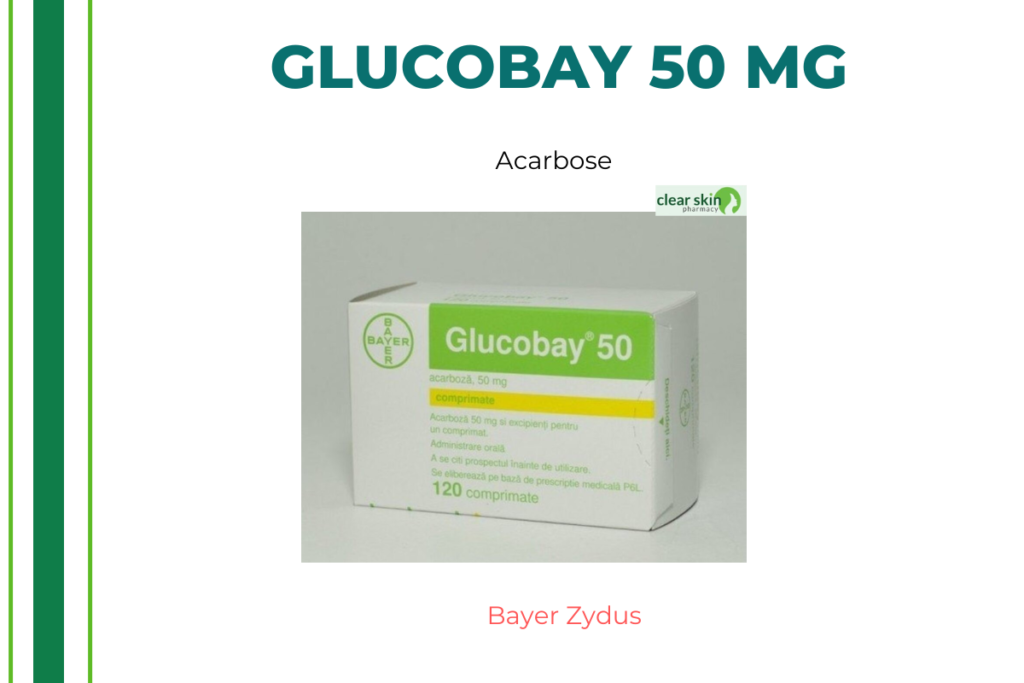
Medicinal Advantages
Glucobay 50 is an anti-diabetic medication prescribed to people with type 2 diabetes whose blood sugar levels cannot be controlled solely through diet and exercise. Glucobay 50 is a prescription drug that may be used alone or in conjunction with other medications. Glucobay 50 inhibits the digestive enzymes responsible for the transformation of complex sugars and starches into simple sugars. As a result, the absorption of sugar into the blood is delayed, and the rise in blood sugar levels following a meal is reduced. Diabetes-related complications, such as eye problems, kidney damage, eye damage, and limb loss, can only be prevented by controlling blood sugar levels.
Use Instructions
It is recommended that you take Glucobay 50 as prescribed by your doctor. Glucobay 50 should be thoroughly chewed with food, preferably with the first bite of each meal, or swallowed with a small amount of water. Avoid crushing or shattering the object. Adhere to the diet prescribed by your doctor.
Storage Keep away from direct sunlight and store in a cool, dry location.
Glucobay 50 Adverse Reactions
Glucobay 50, like many other medications, may cause common side effects such as flatulence (gas), stomach pain, or diarrhea. The majority of Glucobay 50’s side effects are minor and resolve on their own. If side effects persist, however, you should consult your physician.
Adverse Drug Reactions
If you have severe kidney or liver disease, ulcerative colitis or Crohn’s disease (conditions that cause bowel swelling, diarrhea, bowel pain, vomiting, and weight loss), or a large hernia in the intestine, you should inform your doctor before taking Acarbose (bulging of a tissue or organ through an unusual opening). Acarbose is contraindicated in pregnant and breastfeeding women. Therefore, women who are pregnant or nursing should consult a physician before taking Acarbose.
Interactions Between Drugs
Other diabetic medications (insulin, metformin), antibiotics (neomycin), heart medications (digoxin), cholesterol-lowering medications (cholestyramine), and medications containing digestive enzymes (lipase, amylase) and intestinal absorbents may interact with acarbose (charcoal).
Acarbose and table sugar (cane sugar) may interact to induce diarrhea or severe abdominal pain. Avoid sugar (cane sugar) and sugar-containing foods. In addition, alcohol consumption should be avoided while taking Acarbose, as it may result in abnormally high or low blood sugar levels.
Consult a doctor prior to using Acarbose if you have severe kidney or liver disease, ulcerative colitis or Crohn’s disease (conditions characterized by bowel swelling, diarrhoea, bowel discomfort, vomiting, and weight loss), or a large hernia in the gut.
Safety Recommendations
ALCOHOL
Alcohol should be avoided while taking Acarbose, as it may cause abnormally high or low blood sugar levels.
PREGNANCY
Acarbose is a pregnancy category B drug and, due to a lack of clinical data, is typically not recommended for pregnant women.
BREAST FEEDING
As Acarbose may be excreted into breast milk, breastfeeding should be avoided while taking this medication.
Acarbose has been shown to have no effect on the ability to drive or operate machinery.
LIVER
Acarbose should be administered with caution, particularly in the presence of a family history of liver diseases or disorders. Your doctor can adjust the dosage as necessary.
KIDNEY
Acarbose should be administered with caution, particularly in the presence of a family history of renal disease or kidney problems. Your doctor can adjust the dosage as necessary.
Advice on Diet and Lifestyle
At least thirty minutes per day should be devoted to regular physical activity, such as cycling, walking, running, dancing, or swimming. Perform at least 150 minutes of exercise per week.
Maintain a healthy weight, since obesity is also associated with the development of diabetes.
Consume a low-fat and low-sugar diet. Replace foods containing carbohydrates with whole grains, fruits, and vegetables, as the conversion of carbohydrates to sugars results in elevated blood sugar levels.
Avoid alcohol and cigarettes.
Special Guidance
Continue to take Acarbose even if your glucose levels appear stable. If you miss a dose, do not double it; consult your doctor instead.
Acarbose should be taken with small, regular meals to avoid prolonged fasting. The symptoms of hypoglycemia (low blood sugar) are profuse perspiration, disorientation, palpitations, shivering, intense thirst, a dry mouth, dry skin, and frequent urination. Immediately consume 5 to 6 candies, 3 glucose biscuits, or 3 tablespoons of honey/sugar and consult a doctor if you experience any of the above symptoms. Carry these at all times, especially on lengthy journeys.
Before prescribing Acarbose, it is generally preferred that your physician be aware of any underlying conditions, such as renal or liver disease, a previous heart attack, or alcohol consumption.
When using Acarbose to monitor blood sugar and enzyme levels, it is recommended to conduct routine blood tests.
In addition, this item cannot be returned.
Concern for Patients
Type 2 diabetes is a chronic (long-lasting) condition characterized by insulin resistance. Consequently, individuals with type 2 diabetes either produce insufficient insulin or demonstrate insulin resistance. Diabetes type 2 is commonly referred to as adult-onset diabetes because it is more prevalent in middle-aged and elderly adults. Increased thirst, nighttime urination, poor wound healing, an increase in appetite, fatigue, and impaired vision are characteristics of type 2 diabetes. In rare instances, weight loss is possible, whereas weight gain is possible under certain conditions. Type 2 diabetes complications include nerve damage, kidney issues, retinal damage or blindness, amputation of limbs, sexual dysfunction, and an increased risk of heart attack or stroke.
FAQs
It is not advised to take Acarbose with digoxin (a prescription used to treat heart conditions), as the combination of these two medications may reduce digoxin’s effectiveness by lowering its blood level. If you are prescribed these medications together, it is recommended that you contact your doctor so that the dosage can be adjusted appropriately for safe use.
Acarbose frequently causes diarrhea as a side effect. Additionally, consuming table sugar (cane sugar) or foods containing it may cause diarrhea or severe abdominal pain. However, you should seek medical attention if the condition worsens or persists for more than two or three days.
Acarbose alone does not cause hypoglycemia. Low blood sugar may occur when Acarbose is combined with other diabetes medications, alcohol consumption, increased physical activity, or skipping or delaying snacks or meals. Consult a physician if you experience low blood pressure symptoms such as dizziness, nausea, lightheadedness, dehydration, or fainting.
Acarbose should not be taken in excess of the recommended dose, as this may lead to increased flatulence (gas), stomach pain, or diarrhea. For the next four to six hours following an overdose, avoid consuming beverages and foods containing carbohydrates. If your symptoms persist or worsen, however, you should consult a physician.
It is not advised that you stop taking Acarbose on your own, as doing so could result in repeated symptoms or worsen the condition. If you experience any side effects while taking Acarbose, please inform your doctor so that an alternative medication can be prescribed.

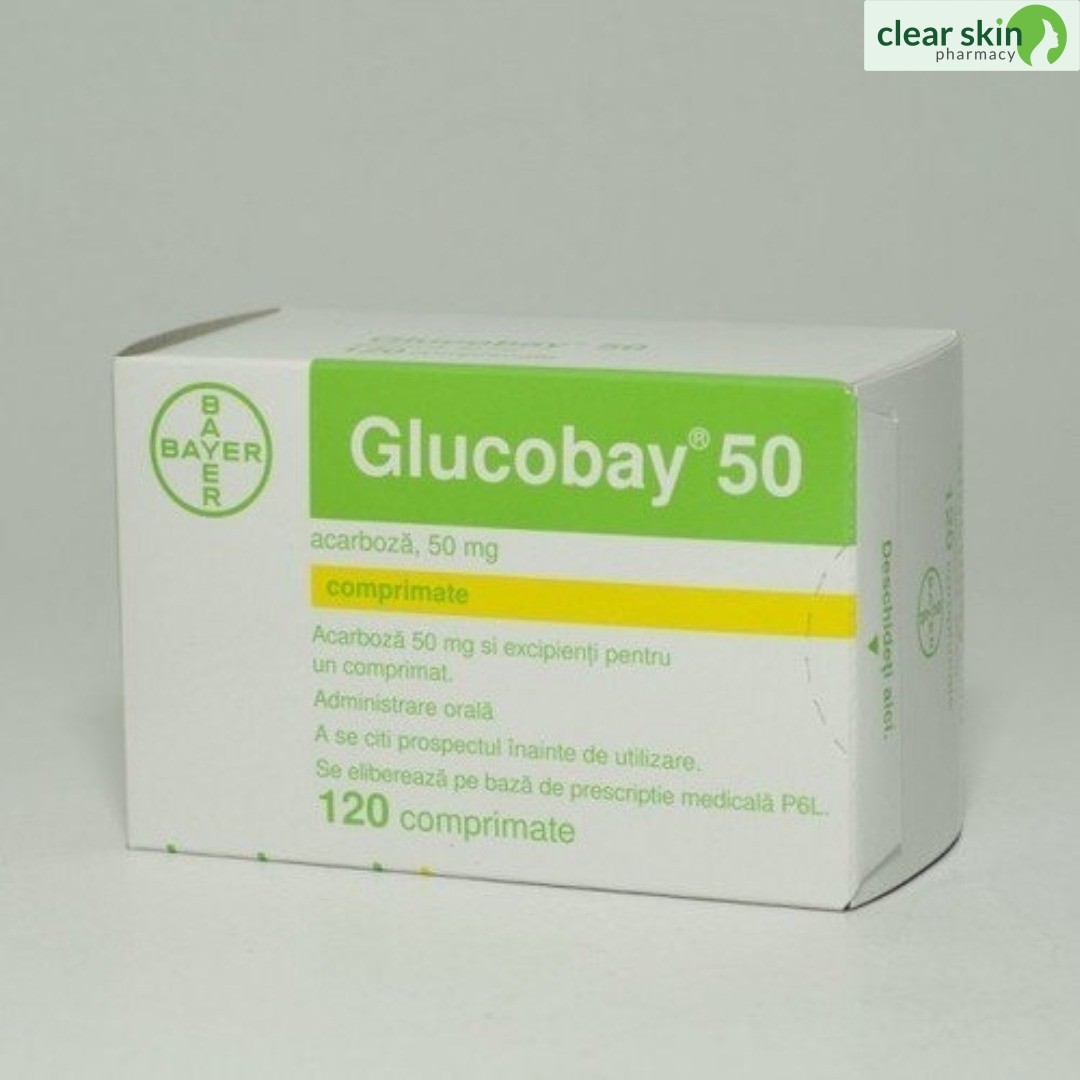
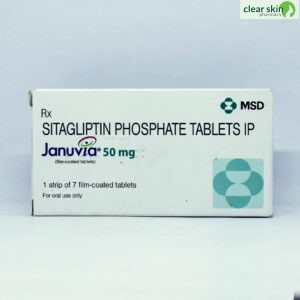
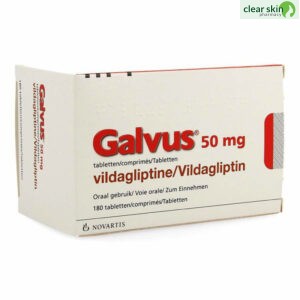
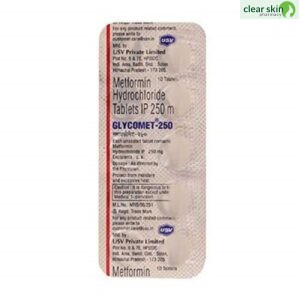
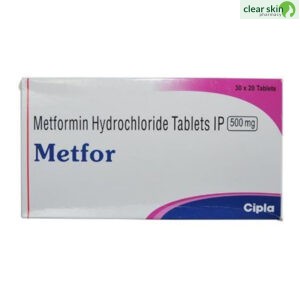

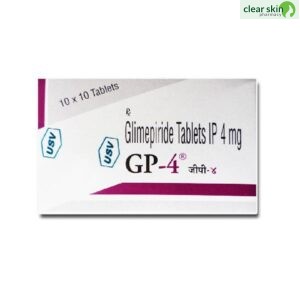
Be the first to review “GLUCOBAY 50 MG 10 Tablets”